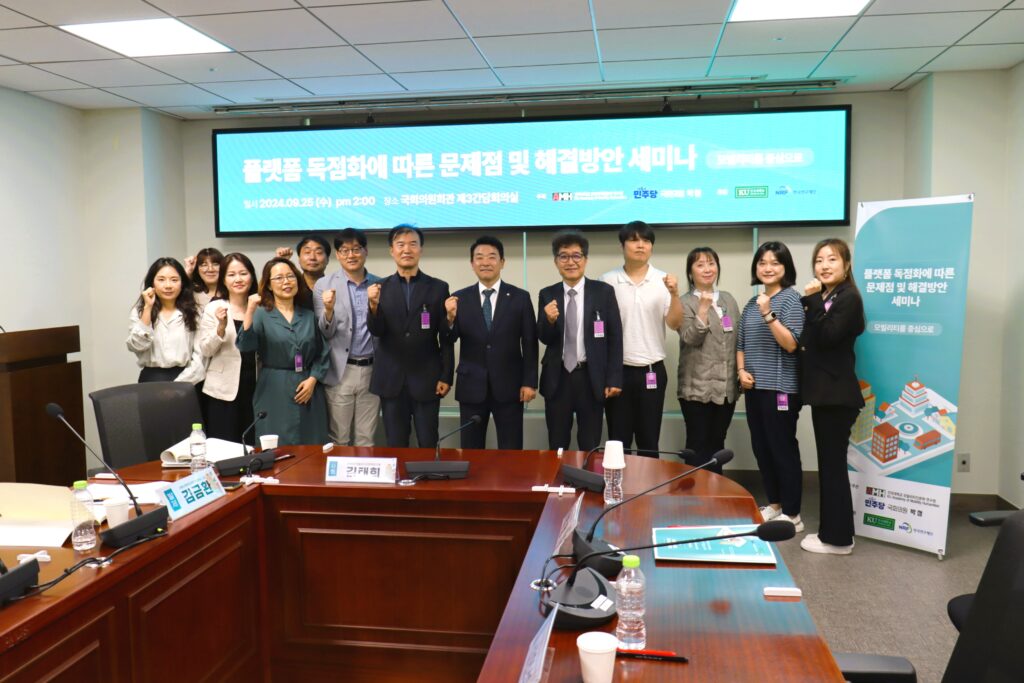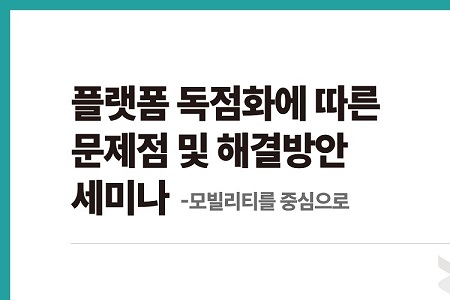“Problems and Solutions from Monopolization in Mobility Platforms”
Host: The Academy of Mobility Humanities and Jung Park, Member of National Assembly
1st Seminar: Mobility Justice and Mobile Commons
- Date: Thursday, 22nd August, 2024, 14:00
- Location: #11 Meeting Room, National Assembly Building
- Moderator: Yonggyun Lee (Department of Geography Education, Chonnam National University)
- Discussion: Youngsin Jeong (Department of Sociology, The Catholic University of Korea), Taehee Kim (The Academy of Mobility Humanities)
2nd Seminar: Platform Workers and Labour Rights
- Date: Wednesday, 4th September, 2024, 14:00
- Location: #3 Meeting Room, National Assembly Building
- Moderator: Eunjung Park (Department of Law, Korea National Open University)
- Discussion: Jinhee Jang (Strategy Coordination Team, Federation of Korean Trade Unions), Bomi Lim (The Academy of Mobility Humanities)
3rd Seminar: Strategies for Enhancing Mobility for the Economically Disadvantaged
- Date: Wednesday, 25th September, 2024, 14:00
- Location: #3 Meeting Room, National Assembly Building
- Moderator: Keumhwan Kim (Seoul Social Welfare Graduate University)
- Discussion: Ingyu Choi (Institute of Social Science, Yeungnam University), Bomi Lim (The Academy of Mobility Humanities)
Discussion Forum: Alternative Policy to Solve the Problems Stemming from Platform Monopolization
- Date: Wednesday, 30th October, 2024, 14:00
- Moderators: Yonggyun Lee (Department of Geography Education, Chonnam National University), Eunjung Park (Department of Law, Korea National Open University), Keumhwan Kim (Seoul Social Welfare Graduate University)
- Discussion: Youngsin Jeong (Department of Sociology, The Catholic University of Korea), Jinhee Jang (Strategy Coordination Team, Federation of Korean Trade Unions), Ingyu Choi (Institute of Social Science, Yeungnam University), Bomi Lim (The Academy of Mobility Humanities)
The Academy of Mobility Humanities (Director: Inseop Shin) and office of Jung Park, Member of National Assembly from Democratic Party of Korea (Environment and Labour Committee) co-hosted a seminar and discussion forum to address the issues stemming from platform monopolies and explore solutions. The event focused on solving labour alienation problems from the monopolization of mobility platforms and finding ways to improve mobility for the economically disadvantaged.
The seminar series started on 22 August with the topic “Mobility Justice and Mobile Commons,” followed by “Platform Workers and Labour Rights” on 4 September, and “Strategies for Enhancing Mobility for the Economically Disadvantaged” on 25 September. The final discussion for recommending specific policies was presented on 30 October at the National Assembly.
In the first seminar, Professor Yoggyun from the Department of Geography Education at Chonnam University explained the importance of mobile commons for social progress. He pointed out that while digital platform services can expand mobile commons, they can also pose a threat to them. He emphasised the need to create a social environment where mobile networks can support digital sharing in order to overcome the digital platform monopolies.
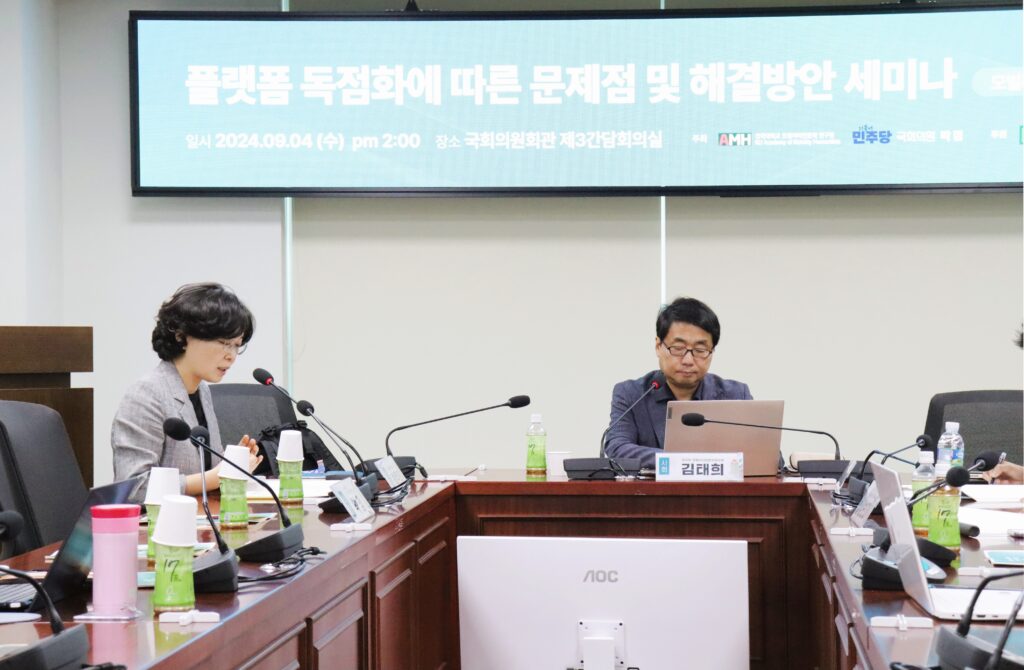
In the discussion, Professor Younsing Jeong from the Department of Sociology at the Catholic University of Korea highlighted that mobility infrastructure is an important common resource in modern society, but it is largely controlled by the government and large corporations. Professor Jeong suggested ways to take back this common resource, which is monopolized, for the citizens. Another discussant, Professor Taehee Kim from the Academy of Mobility Humanities, explained the social implications of mobility technology and examined the relationship between mobile commons and a fair society from the perspective of mobility humanities, raising questions about its practical application in South Korea.
In the second seminar, Professor Eunjung Park from Korea National Open University presented “The Status and Issues of Platform Workers.” Professor Park explained that, as of 2023, although 3 out of every 100 workers in South Korea are platform workers, these workers are not fully protected under traditional labour laws. Professor Park discussed these issues and reviewed laws related to platform workers that have been proposed since the previous government, emphasising the need to reform current labour laws.
The discussant, Researcher Jinhee Jang from the Federation of Korea Trade Unions, pointed out that the insurance currently provided to platform workers is ineffective and stressed the need for solutions. Researcher Jang also explained the problem of algorithms used by platform companies, arguing that these algorithms are used to control platform workers and should be regulated. Another discussant, Professor Bomi Lim, emphasised that platform labour is a challenge that calls for a shift in labour laws and should be addressed from the perspectives of justice and fairness.
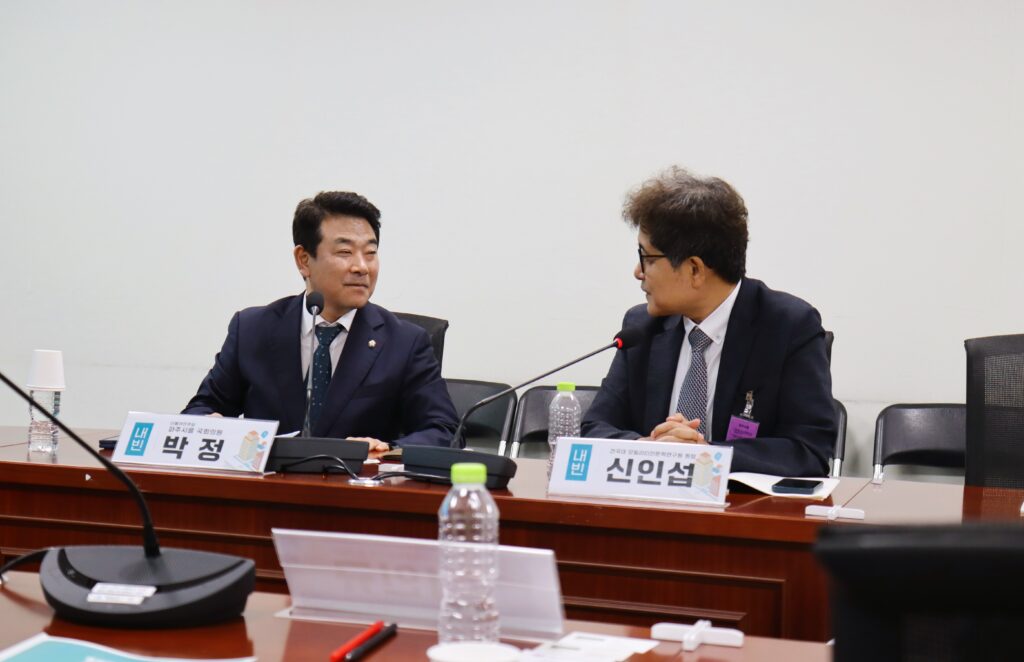
In the third seminar, Professor Keumhwan Kim from the Seoul Social Welfare Graduate University proposed that “economically disadvantaged groups should be included in transportation welfare programmes” and suggested “improving their mobility through expanded transportation vouchers and better access to public transportation.” In response, Professor Ingyu Choi from the Institute of Social Science at Yeungnam University agreed with the idea but pointed out that “considering the financial issue on the government, a step-by-step approach and practical planning are needed to solve the problem.” Another discussant, Professor Bomi Lim from the Academy of Mobility Humanities, highlighted problems in the current transportation welfare system and proposed legislative solutions to solve them.
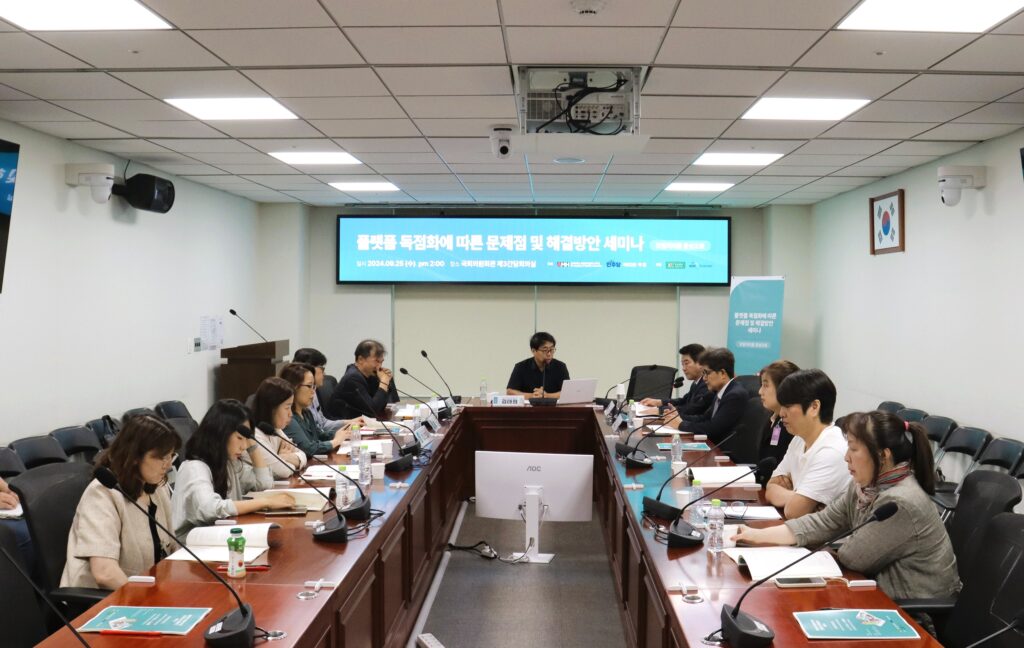
Based on the discussions from the three seminars, a forum titled “Alternative Policy to Solve the Problems Stemming from Platform Monopolization-Focusing on Mobility” was held on 30 October in Meeting Room 4 of the National Assembly Building. The first speaker, Professor Yonggyun Lee from Chonnam National University, highlighted the significance of digital platforms in modern society as a form of mobile commons, emphasizing that the practice of mobile commons can drive social progress. Next, Professor Eunjung Park from Korea National Open University argued that to solve the labour rights issue of non-standard workers, such as platform workers, it is necessary to introduce a provision for presumed workers. The final speaker, Professor Keumhwan Kim from the Seoul Social Welfare Graduate University, discussed the need to improve mobility for economically disadvantaged groups and proposed specific solutions.
